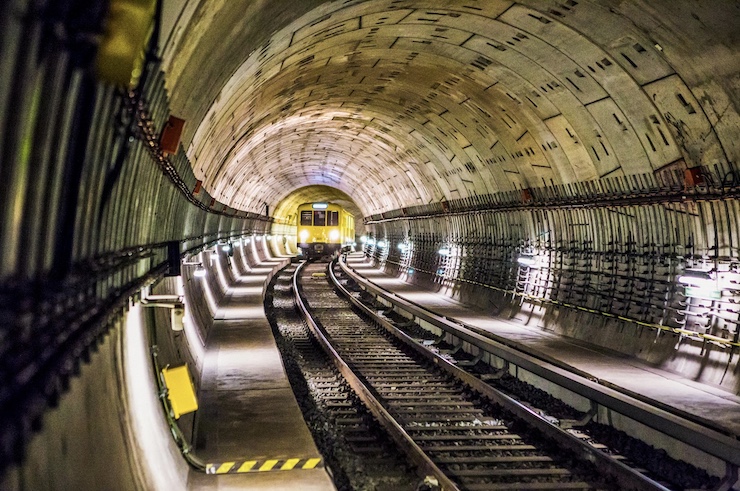Japan Deploys Drones To Inspect Tunnels

Tunnels play a key role in a nation’s structural framework. They are crucial for connecting various regions, facilitating efficient transportation, and supporting utility infrastructure. As one of the most seismically active countries in the world, Japan’s tunnel systems have been engineered to meet a unique set of standards. This specialized engineering includes seismic isolation systems, flexible joints, reinforced linings, and the use of multi-purpose underground utility tunnels. As of 2024, Japan has approximately 3,170 miles of roadway tunnels, about 1,503 miles of railway tunnels, and 3,325 miles of utility tunnels. Guaranteeing that all of these tunnels remain in prime working order requires rigorous maintenance inspections.
Traditionally, inspections were carried out manually by engineers and construction workers who physically entered the tunnel spaces. This process was labor-intensive, costly, time-consuming, and often yielded less accurate results. Additionally, exposing workers to confined, dusty, and low-oxygen environments, where falling debris or noxious fumes pose significant safety risks, adds to the dangers. During inspections, transportation and utility services typically needed to be shut down, further complicating logistics. For these reasons, Japan, like many other countries, is turning to drone and AI technology to streamline tunnel inspections.
Japan’s Toda Construction Co. has recently announced a new drone platform designed to save time and money, enhance worker safety, and provide the most accurate inspection data. Founded in 1881 by Rihei Toda, the company has evolved greatly over its more than 100 years in business. Headquartered in Tokyo, Toda specializes in domestic and international civil engineering projects that incorporate the latest technological advancements. This includes engineering work for much of Japan’s tunnel infrastructure. To leverage the benefits of drone technology, Toda has partnered with Spiral Co. and GreenBee Inc., both based in Tokyo.
Spiral, founded in 2016, specializes in autonomous drone solutions for indoor environments, particularly where GPS signals are unavailable. Technology firm GreenBee was originally established as sMedio Corporation in 2007 and rebranded in 2024 to reflect its commitment to building a sustainable future through technology. For Toda’s tunnel inspection project, Spiral provided the drone hardware, while GreenBee developed the AI software.
The drone platform Spiral supplied is the Non-SLAM Autonomous Flying Drone, based on the company’s patented MarkFlex Air (MFA) system. According to Spiral, the MFA system enables drones to fly autonomously in GPS-denied environments such as indoor warehouses or subterranean tunnels. “Autonomous flight is realized,” the company explains, “by the camera mounted on the drone recognizing a marker containing flight instructions.”
This marker is a QR code placed along the drone’s flight path. When the drone scans the code, it receives all mission objectives, including detailed flight plans and specific data to be collected. This data is then processed by GreenBee’s AI analysis software. For Toda, GreenBee designed a bespoke program to analyze the exposed surfaces at the end of tunnel excavations, known as tunnel faces. The software autonomously sorts through hundreds of images taken by the drone to select the best ones and identify any issues requiring attention.
Several additional considerations were necessary to optimize drone performance. For example, the drone needed a sufficiently bright light to scan QR codes and capture clear images in the dark tunnel environment. Obstacle avoidance sensors were also installed to enable the drone to autonomously navigate around construction equipment. Furthermore, a custom storage and charging box was built to keep the drone dust-free for optimal performance. Toda has been testing this drone inspection system extensively in mountain tunnel passes.
The data collected during these drone trials has significantly accelerated inspections, reduced the time required, and minimized worker safety risks. Whereas manual inspections of tunnel faces previously took at least two hours to complete, Spiral’s drone, combined with GreenBee’s AI software, allows Toda to comprehensively and accurately inspect a tunnel face in as little as 17 minutes.
With the success of the drone inspection trials, Toda now says it will fully implement the system throughout all of their tunnel operations by the end of 2025. As technology continues to advance, the integration of autonomous drones and AI in tunnel inspections represents a transformative step toward safer, faster, and more cost-effective infrastructure management, ensuring that vital underground networks remain reliable for generations to come.
|